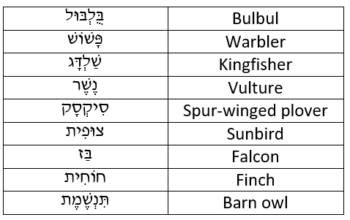Birds Hebrew Vocabulary Posted by Ayana on Feb 28, 2022 in Idioms, Language, Vocabulary
Located in the crossroads between three continents, Israel is on one of the world’s busiest migration flyways. Twice a year, 500 million birds fly over Israel. They leave Europe in the autumn on their way to Africa, making the long journey back in the spring. With hundreds of species passing through a small area, Israel became one of the world’s top birdwatching destinations.
The Hebrew noun for bird is צִיפּוֹר (pronounced as tzi-por). Although the word ends with a consonant like most masculine nouns, it is actually a feminine noun. Its plural form also belongs to the list of exceptions and ends with the masculine plural ending – צִיפּוֹרׅים (pronounced as tzi-po-rim). To read more about the Hebrew plural form click here. Despite the masculine endings, the two nouns are feminine and all the verbs and adjectives referring to decline as feminine, too. For example:
צִיפּוֹר קְטַנָּה.
Little bird.
צִיפּוֹרׅים יָפוֹת.
Beautiful birds.
הַצִּיפּוֹר פָּרְשָׁה כְּנָפַיים וְעָפָה.
The bird spread its wings and flew away.
הַצִּיפּוֹר פָּצְתָה מַקּוֹר.
The bird opened its beak.
הַצִּיפּוֹרׅים צִיְּצוּ לְלֹא הַפְסָקָה.
The birds chirped non-stop.
A catchy Hebrew song about migratory birds is one of my favorite:
Notice the feminine form of the verbs in the short lyrics:
צִפּוֹרִים! צִפּוֹרִים!
לְאָן אַתֶּן עָפוֹת? לְאָן אַתֶּן עָפוֹת?
קַר לָנוּ קְצָת בַּנּוֹצוֹת
לַדָּרוֹם אָנוּ עָפוֹת
צִפּוֹרִים! צִפּוֹרִים!
מָתַי אַתֶּן חוֹזְרוֹת? מָתַי אַתֶּן חוֹזְרוֹת?
כְּשֶׁהַחֹרֶף יַעֲבֹר
לַצָּפוֹן שׁוּב נַחֲזֹר
In 2008, in a national survey of the Society for the Protection of Nature in Israel, over 150,000 people voted and chose the national bird of Israel. In a special ceremony which took place in the President’s house in Jerusalem, the President of Israel, has declared: the hoopoe (דּוּכִיפַת) is the national bird of Israel.
The other nine finalists for the title were:

Some of them appear in the next song about a cheerful chorus of birds on a cypress tree:
Lyrics:
על ראש הברוש שבחצר
שמחה והמולה,
שם כל הציפורים בעיר
הקימו מקהלה.
העפרונית הסולנית
ניקתה את הגרון,
שילבה כנף, זקפה מקור
וגם פצחה ברון.
ציף ציף, שריק שרק
בול בול בול בול ביל בל
לה לה לה…
וכל מי ששמע אמר,
אח איזו מקהלה.
פתאום הפסיק את השירה
פשוש אחד זעיר,
אם אין מילים ואין תווים
הוא לא מוכן לשיר.
“אנחנו לא רוצים מילים”,
רגזו הבולבולים,
“אנחנו, גם ללא מילים,
נורא מתבלבלים”
ציף ציף, שריק שרק…
הסנוניות כתבו תווים
על חוט ועל גדרות,
תוכי אחד לימד אותן
מילים נהדרות.
אלפי דרורים ועפרונים
פרצו מיד בשיר,
ומקולות הבולבולים
התבלבלה העיר.
ציף ציף, שריק שרק…
“אוי די כבר, די לכם לשיר”,
צעק פתאום הברוש,
“לכו לישון, כבר מאוחר
כואב לי כבר הראש”
האופרטה היפה
לא באה עד סופה –
מחר יצפצפו קונצרט
על עץ הצפצפה.
ציף ציף, שריק שרק…
A famous Hebrew idiom says: טוֺב צִיפּוֹר אַחַת בַּיַּד מִשְתַיִים עַל הָעֵץ. It is literally translated to one bird in the hand is better than two perching on the tree, an equivalent to the English idiom a bird in the hand is worth two in the bush. The ancient idiom uses birds as symbols of achievements. The bird in the hand symbolizes something you have; the two birds on the tree symbolize something bigger that you have not achieved yet. A bird in the hand is a sure thing, two birds on the tree is a double but they can fly away. It means it is better to have one small actual accomplishment than a greater one that is still a dream or a promise. For example:
אַל תְּמַהֵר לְהִתְפַּטֵּר. קֹודֶם תִּמְצָא מִשְׂרָה שֶׁמַּתְאִימָה לְךָ. טוֺב צִיפּוֹר אַחַת בַּיַּד מִשְתַיִים עַל הָעֵץ.
Don’t rush to quit. First find a job that suits you. One bird in the hand is better than two perching on the tree.
If you wish to read more about birds in Hebrew visit the Israeli Birding Site of the Society for the Protection of Nature in Israel.
Keep Calm and Learn Hebrew

Build vocabulary, practice pronunciation, and more with Transparent Language Online. Available anytime, anywhere, on any device.




